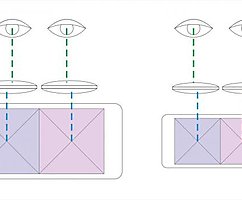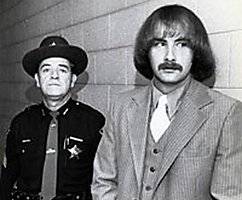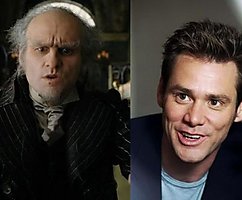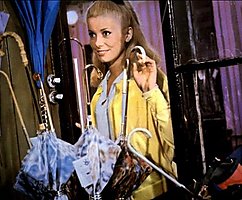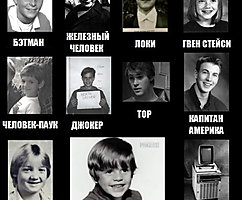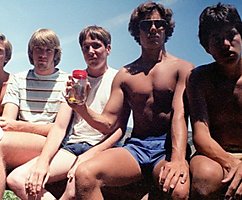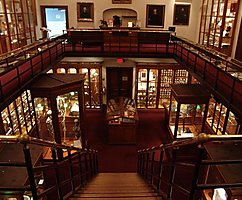You— it's your conscience: why ethics defines our individuality
 Bashny.Net
Bashny.Net

photo:shutterstock
In order to cognize the "I", it is not enough to define your passions, goals and ambitions, and the rejection of them will not make you a different person. Even personal memories, as shown by studies and personal experiences of people with amnesia are not the decisive criterion for identification. But the romantic notion that our identity shape moral principles, and, abandoning them, a person loses themselves unexpectedly supported scientists. An abridged translation of an article by American psychologist Nina Strohminger written for Aeon magazine.
One woman — let's call her Kate, woke up one morning in his bed and was surprised to find that lying next to a strange man. It was very similar to her husband: the same red beard, the same freckles scattered across her shoulders. But it was clearly not her husband. In a panic she quickly got ready and headed to his psychiatrist. On the bus she noticed the man who very often came into her eyes for the last few weeks. He clearly was a spy. Stranger constantly changed its appearance: it was in the form of a little girl in a summer dress, dressed as a bike messenger. She started to tell me about all these strange incidents the doctor, but every minute is becoming less and less trusted him, until finally, with horror, realized that this man, too, was an impostor.
Kate Capgras syndrome, in which the patient believes that someone from his entourage (husband, wife, parents, and the like) or he himself was replaced by a lookalike. In addition, it suffers from a syndrome Fregoli — belief that some person is actually familiar, but changes the appearance and makes himself up as a skilled actor.
Syndromes of Capgras and Fregoli indirectly telling us that in the mind of a healthy person has a unique cognitive mechanism, which is so delicately and finely tuned that we do not even suspect. This mechanism gives each person individuality and then carefully monitors all changes that occur to person. This mechanism is vital for almost any type of human communication: from talk to party in the family life. Without it we quickly become antisocial.
The seventeenth century philosopher John Locke believed that the key factor in determining personality are the personal memories. Why? From the memoirs of a continuous fabric of life unique to each person. But the evidence in favor of this factor is at best ambiguous. The people who lost their memory as a result of retrograde amnesia, claim that their identity remained unchanged despite the fact that their memories were erased. Dementia that leads to memory impairment, is also not a guarantee that the self-perception of the person changes. Caregivers of such patients say that, despite significant memory loss, they still the same person as before the disease. If the human body is something responsible for his personality, it is unlikely that memory can become a leader among the possible candidates.
In recent studies of the philosopher Shaun Nichols of the University of Arizona, as well as in my own work, the argument in favor of the fact that the formation of the person responsible moral values. One of our experiments refers to the thought experiment Locke. The subjects were asked what traits they would have taken if I moved to another body. Quality, relevant to morality, often appeared in the display in comparison with other properties — both mental and physical. Interestingly, certain types of memories (involving people) often survive when this "transmigration of souls". But the General episodic memories, e.g. daily way to work, was overboard. People are not so much concerned about the memory, as the ability of memory to connect us to each other and our ability to socialize.
In another study, subjects read a story about a patient who is suffering from various cognitive disorders including amnesia, loss of ability to recognize objects, their own desires and the loss of a moral compass. Most people answered that the patient was starting to look like himself when he lost the moral quality.
These results confirm the more widely known cases from the history of neurology. Phineas gage, an American Builder, who lived in the nineteenth century, was severely wounded during the laying of a railway explosion, and his skull impaled by a metal rod. However, the victim regained consciousness a few minutes after the injury and after two months was able to return to an active lifestyle. After the wound soft and hardworking gage became self-willed and irritable person who is constantly swearing. It is believed that this injury has led to so considerable negative changes in his emotional status, social skills and personality.
"Without the ability to distinguish group members from each other the individual would not be able to figure out who helped him, and who was hiding. It is impossible to build a formal moral system without identity"
Other types of brain damage can also threaten the individual, but render her less of an impact. In the story "the Lost Mariner," Oliver sacks describes the case of Jimmy, who almost completely lost his memory due to Korsakoff's syndrome (a disorder in the brain caused by excessive consumption of strong alcoholic drinks). Sachs expresses concern that his patient lost soul. But his opinion changes when he sees how Jimmy behaves during the mass, he takes communion. He recalls the words of the Soviet psychologist Alexander Luria: "a Man consists not only of memory. He has feeling, will, sensibility, morality. And here you can find a way to get through to him and help."
So far we talked only about the third person, that is, what makes us think that the other person is not the same as before. We can assume that in the evaluation of their own identity work. Maybe in this case, episodic memory is crucial. However, in my new study, done in conjunction with psychologists Larisa Khayfets and Liane young of Boston College, we have proved that the only important feature in the evaluation of their own identity are moral beliefs. We are concerned about the moral qualities in the formation of opinions not only about the identity of another person, but on his own.
Why is our internal mechanism of identification so distinguishes moral qualities? We are not the brightest distinctive features. Face, fingerprint, strange behavior, and biographies of the people: for any of these signs it is much easier to tell who is who. A bit paradoxically, the individuality, to a lesser extent depends on what makes us different from other people, rather than what unites us.
Think about why it is important for us to distinguish between people. Most animals have no internal mechanism of identification. But those species that possess them, and tend, like humans, get to know each other, live in communities. To survive, they need to unite. Evolutionary biologists have noted that the ability to monitor the identity of the necessary to aid or revenge. If someone breaks the rules or, on the contrary, helps in a difficult situation, it is important to remember to continue to repay the same coin. Without the ability to distinguish group members from each other the individual would not be able to figure out who was helped and who was hiding, who shared, and who was a miser.
It is impossible to build a formal moral system without identity. Thomas Reid, philosopher of the XVIII century, noted that the principles of justice — rights, obligations, responsibility, is impossible without identifying the person as a unique individual. If a person has no connecting threads between the different moments of his life, that tomorrow people can't be responsible for the actions of a person today. Our mechanism of identification operates in the higher gears, when certain crimes are explained by passion, the influence of any substances, turbidity of mind. If the person was beside himself or out of his mind during the Commission of the crime to identify the perpetrator and who recognize responsibility?
Moral quality is the main dimension on which we judge and choose social partners. For both men and women the most important feature when choosing a romantic partner is kindness. It wins its significance is beauty, wealth, health, common interests, and even mind. And because we often consider as friends those who are wonderfully in tune with our personality, moral qualities play a decisive role in whether we like or not (what social psychologists call a formation experience), and define the success and durability of such relationships.
The virtues often mentioned in obituaries than achievements, abilities and talents. This is true even obituaries about celebrities, which often write in their achievements, not moral properties.
The mechanism of identification is focused on identification of the moral qualities, because it is the most important type of information we can obtain about the other person. But we still talked about the question in reverse order. We don't want to say that personality is formed around a set of moral qualities. But morality requires that the idea of individuality, gives it life, gives it the right to exist. If we had no conscience we would have no needs and personality. People have very bulky and complex social and moral system, and accordingly, the inflated ego.
"Know thyself" is unfounded, cheap platitude they tried many times to revise and rethink, but she is still horribly empty. She turns, but very superficially, to the existential question that haunts all men: what does it mean to know yourself? The lesson to be learned from the internal mechanism of identification: dig deeper, go beyond memories, professional ambitions and favourite authors and small talk — and discover a whole galaxy of various moral qualities. It is their need to grow and improve if we want people to know who we really are.
Source: theoryandpractice.ru
Tags
See also
Umberto Eco on why you need to develop memory and why its weakness - our curse
Library of liberty: the liberal society in ten books
Why almost all of our "pillars" of success is an illusion
James Altucher: a Manual for those wishing to radically change the sphere of activity
K-535 and a little Polish.
Life becomes, what you BELIEVE MOST
Perhaps people see colors differently
The story of how just one phrase helped save marriage
Flawless - PROPER USE OF ENERGY.


